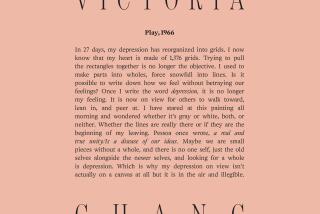FICTION
- Share via
MEMORIES WITH TREES by Ilse Tielsch, translated by David Scrase. (Ariadne Press: $12.50; 109 pp.) There is no way to resist a book that begins: “The juice pear trees blossomed in May, just as they had always blossomed.” Even if you grew up in the densest, most urban environment, there are trees somewhere in your memory. This little novel is an exercise in memory, that of Anna, who was sent during World War II to her Aunt Walburga’s farm, which meant to safety and sanity and routine like the juice pear trees. She returns many years later, on her way somewhere else, and remembers her childhood on Aunt Walburga’s farm as if it were a film that she cannot “project herself into.” She cannot shake the feeling that she “had not been there.” It is also, of course, the memory of the author, who fled from Czechoslovakia to Austria in 1945. Tielsch is a poet and novelist, and this memoir is a graceful combination of the two arts. She repeats phrases, like “juice pear trees,” or the word “foreign” the way a child would sound these phrases out, or the way an adult tries to make sense of them and put them in a context, or most graphically, the way a deaf person forms them with his or her hands. Often words and phrases are set in capital letters, like THE WAR IS OVER or ENEMIES. Words that just don’t mean the same thing at different times in different places. At any rate, it is very useful to have Aunt Walburga’s farm in your memory, IN CASE you need to go there sometime.
More to Read
Sign up for our Book Club newsletter
Get the latest news, events and more from the Los Angeles Times Book Club, and help us get L.A. reading and talking.
You may occasionally receive promotional content from the Los Angeles Times.










